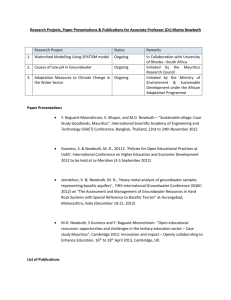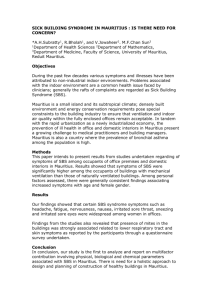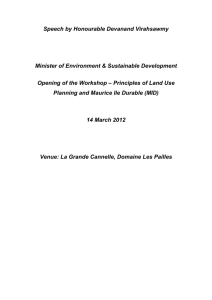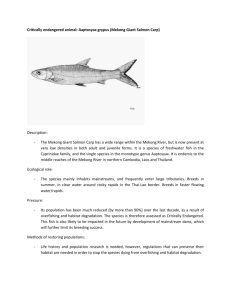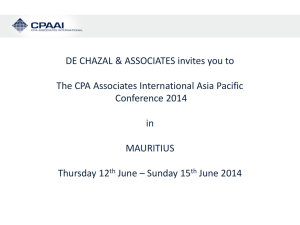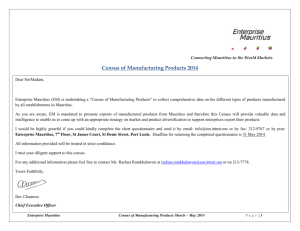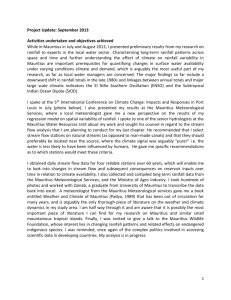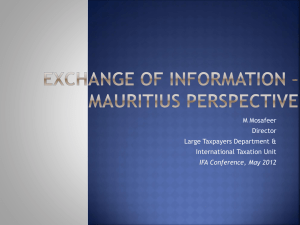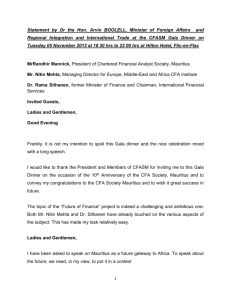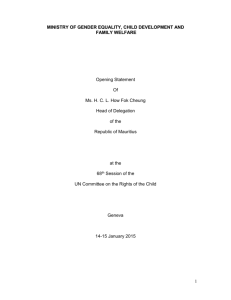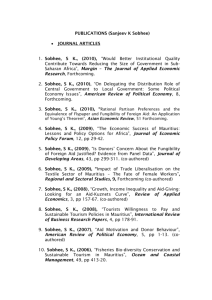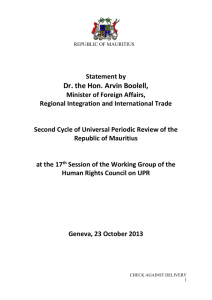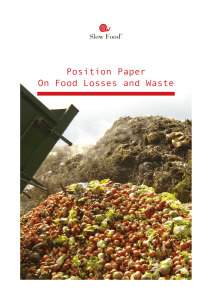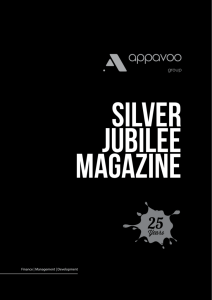13.07.03 Env Day R. Prayag SSS
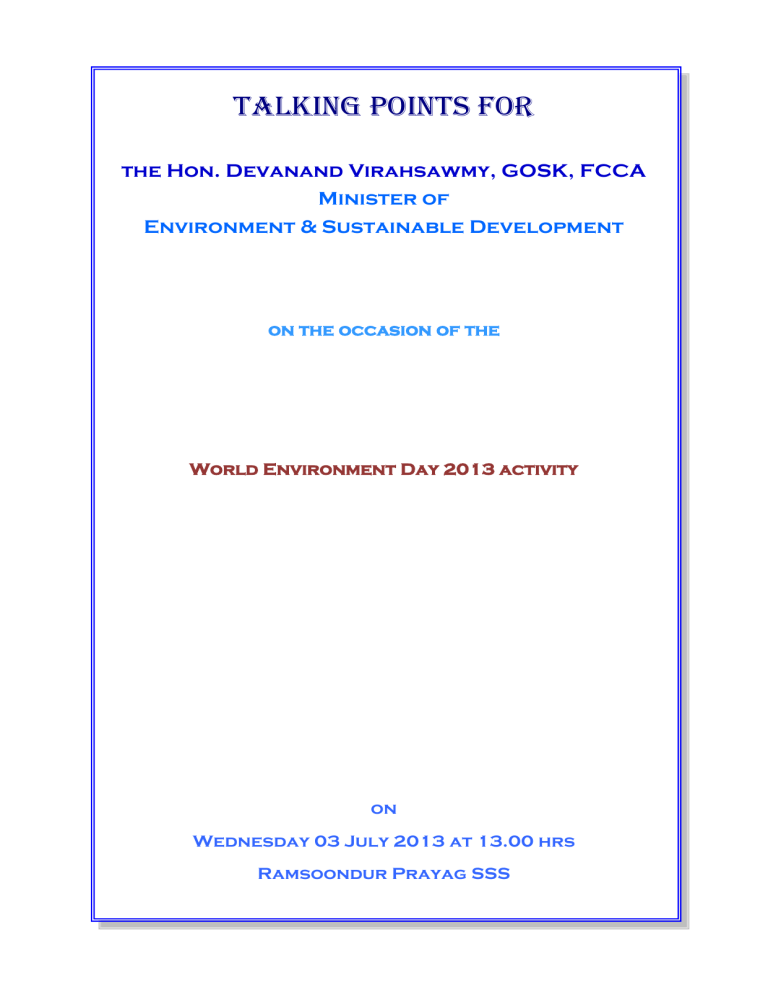
Talking Points for
the Hon. Devanand Virahsawmy, GOSK, FCCA
Minister of
Environment & Sustainable Development
on the occasion of the
World Environment Day 2013 activity on
Wednesday 03 July 2013 at 13.00 hrs
Ramsoondur Prayag SSS
The Director of Education Zone 1
The Rector of Ramsundar Prayag SSS
Rectors, Head Teachers
Members of the Parent-Teachers Association
Dear Students
Ladies and Gentlemen
I am pleased to be in your midst today for this important activity which is organized in the context of the World Environment Day 2013. As you are aware, since 5 th June 2013, my Ministry, in collaboration with many stakeholders, has initiated several projects to mark the World
Environment Day. These projects have involved the participation of children, youth, women, NGO’s, communities, local authorities, government and private organizations for their support and their desire for cleaner, greener and brighter outlook for themselves and for future generations.
This year, the theme chosen by the United Nations for the World
Environment Day is “Think-Eat-Save” . This theme acts like a wake-up call against food waste and food loss. It aims at encouraging people to reduce their ecological footprint.
To give you an idea of the magnitude of food wastage at global level and its consequences, I will quote some figures published by the FAO, i.e. the
Food and Agricultural Organisation, which is United Nations’ specialized agency for all issues pertaining to agriculture:
(i) Every year, some 1.3 billion tons of food are wasted in the world
2
(ii) About USD 1 trillion gets lost in food production and consumption systems every year
(iii) Every day, 1 out of 7 people goes to bed without food at night
(iv) Some 20 000 children under the age of 5 die from hunger every day
It has also been reported that some 300 million tonnes of food, produced and wasted in industrialised countries, every year, can feed 900 million hungry people in the world.
We must also bear in mind that food wastage means wastage of resources. For example, it takes about 1,000 litres of water to produce 1 litre of milk. Global food production occupies 25% of habitable land, and consumes 70% of fresh water. It is also responsible for 80% deforestation and accounts for 30% of greenhouse gas emissions which affect the ozone layer which, in turn, impacts directly on climate change.
Being a Small Island Developing State, Mauritius is faced with the increasing negative impacts of climate change. The flooding of 26 March
2008 in Mon Goût and 30 March 2013 in Port-Louis, as a result of torrential rains, constitute a clear evidence that Mauritius is not spared by such impacts.
For instance, the long-term observations of the Mauritius Meteorological
Services, published in 2010, pointed out alarming decreasing trends in annual rainfall, increases in mean temperatures, accelerated sea-level rise and occurrence of flash floods.
3
It is estimated that water supply may not be sufficient to satisfy projected demand by 2030 and agricultural production may decline by as much as
20 to 30 % in the medium to long term due to rainfall variability.
In addition to the problems of food wastage and climate, there is the overgrowing problem of unsustainable consumption and production. Our planet’s regenerative capacity is being greatly exceeded as the world’s population is now producing and consuming more resources than ever. In fact, in developed and developing countries, people are acquiring much more than what they actually need, thus producing an enormous amount of waste .
In Mauritius, unsustainable consumption has caused an increase in the production of solid wastes. The sound management of these wastes has become an increasing challenge with our limited disposal capacity and our low recycling rate.
To tackle these challenges, we have to adopt a sustainable lifestyle. It is with this vision of making Mauritius a model of sustainable development that the Prime Minister, coined the ‘Maurice Ile Durable’ concept in
2008, and mentioned that ( I quote ) “ the ‘Maurice Ile Durable’ project belongs not to its conceptors or to Government but to the whole
Mauritian nation. It is essentially a vision that seeks to transform the environmental, economic and social landscape of the country.” The
Prime Minister has insisted on the fact that MID is a societal project.
As you may be aware the MID Policy, Strategy and Action Plan has been submitted on 31 May 2013 and approved by Cabinet on 14 June2013.
However, many projects funded by the MID Fund have already been
4
initiated. Now that Government has given its blessings, we expect the
MID process to attain cruise speed very soon.
MID projects which have already been implemented are as follows:
(i) The solar water heater programme meant to reduce electricity and gas consumption at household level, thus promoting the use of renewable energy;
(ii) The water saving campaign through the use of “Water Faucet
Aerators” to eliminate wastage of water by reducing consumption.
This campaign targets heavy water users such as hospitals, schools, public buildings, restaurants and hotels;
(iii) The installation of photo-voltaic panels in some 52 schools to produce electricity for their own consumption while selling the surplus to the national CEB grid;
(iv) The sale of one million of Compact Fluorescent Lamps by the CEB at subsidized price to replace conventional bulbs;
(v) The supply of 1450 LED lamps for traffic lights;
(vi) The promotion of household composting aimed at reducing significantly the volume of organic wastes produced by households. As such, some 10,000 households are benefitting from this scheme in the first instance and the second phase of the project is expected to start in about 1-2 months.
My Ministry has also launched several projects to motivate our fellow citizens to adopt good environmental practices in their daily lives. I will just mention a few:
5
(1) The Waste Segregation project in all primary and secondary schools aimed at sensitising school children about sorting of waste into various components for recycling or composting purposes.
Labelled bins of different colours, composting units and resource materials were provided to the schools and colleges for this project.
(2) The school endemic garden project with a view to enhance the knowledge of students on the importance of biodiversity. With a view to sensitise the school population on the project, talks have been delivered by officers of my Ministry and resource materials including a DVD, posters, pamphlet, and toolkits for teachers have been handed over to the schools.
(3)
The “Une Plante, une famille” project which was launched in 2011.
This project consists of providing each family with one medicinal plant to revive the indigenous knowledge of our population for producing and using medicines from medicinal plants and decrease the use of chemically derived medicines. Every year more than
20,000 medicinal plants are distributed to the population free of charge.
(4) The rain water harvesting programme to encourage the judicious use of water and reduce dependence on the CWA’s water network.
(5) The implementation of a Sustainable Consumption and Production programme to promote a more sustainable lifestyle among the population and encourage the efficient use of our scarce natural resources.
6
(6)
Sensitisation on “zero plastic” to curb down the use of plastic carry bags through awareness raising campaign and distribution of long lasting bags.
To conclude I would like to make an appeal to all students and tell them that making of Mauritius a sustainable island is not the sole responsibility of Government. Each and every one of us is called upon to contribute to this national endeavour. Environmental projects launched at school level must, as far as possible be implemented at home, with peers groups, in youth clubs and socio-cultural organizations. This will contribute a long way in changing the mindset of our people to think and act differently so as to protect our environment and the planet at large.
I will end with a quote from Ms Wangari Maathai, Kenyan environmentalist who was the first African woman to win the coveted Nobel Peace Prize in 2004.
I quote: “ We owe it to ourselves and to the next generation to conserve the environment so that we can bequeath our children a sustainable world that benefits all ” (end of quote)
I thank you for your attention.
7

